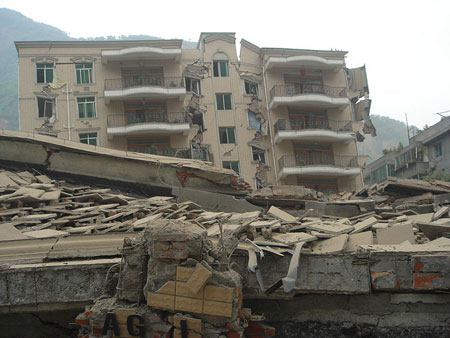Effect of Sichuan earthquakes on brain activity in survivors
Recent research shows that the earthquake in Sichuan, China on May 12, 2008 has left profound effects on the brain function of survivors who seem perfectly healthy. It also leaves a mental health risk for these people. This is the result of research cooperation between the Institute of Psychiatry and colleagues from universities in China, the US and Liverpool.
Researchers want to better understand the adaptation of brain function systems after the pressure from intense emotions. Studies conducted on animals have previously shown the importance of fringe structures and brain veins in responses to fear and stress. Human studies, initially focused primarily on patients with post-traumatic stress disorder with clinical manifestations, have shown abnormalities in similar brain structures. However, there is still little known about the potential change in brain activity in people who survived immediately after a traumatic event like an earthquake.
The epicenter of the earthquake on May 12, 2008 is located in Wenchuan County, about 90 km west of northwest of Sichuan. Seismic intensity is nearly 8 Richter. Up to 45 million people are in direct influence;in which 69,146 people were confirmed dead, 374,131 were seriously injured and 17,516 missing.
A significant portion (20%) of the survivors will likely experience stress-related disorders, such as acute stress response disorder (ASD) and post-traumatic stress disorder (PTSD). . Dr. Andrea Mechelli from the University of London Psychiatry Institute, member of the research team, said: 'With the long-term, serious impacts of these psychological disorders, we need to better understand changes in early brain function adapt to injury. This knowledge can help to better understand post-traumatic reactions and thereby develop effective interventions early. '

The earthquake in Sichuan, China on May 12, 2008 left a profound impact on the brain function of survivors who seemed perfectly healthy.(Photo: Air-worldwide)
With functional magnetic resonance (fMRI), the researchers examined 44 healthy survivors after severe psychological injury. They found that there were significant changes in brain activity similar to those commonly seen in post-traumatic stress disorder that occurred shortly after the victim experienced injury. This suggests early assessment and interventions for survivors.
Previous studies have been conducted year after year or even decades after the victim suffered. No clinical survey has examined the changes in brain activity in survivors such a catastrophic disaster like earthquakes.
The results of this study show that those who have experienced serious trauma will have some areas of brain activity that are overly active and reduce linkages with other regions immediately after the Sichuan earthquake. . In particular, the results indicate that trauma does not only affect the function of each brain region but also the interaction between the parts of the brain system. It is not clear whether this type of change will continue or develop further in the weeks, months following the trauma.
Dr. Mechelli continues: 'A better understanding of the impact of traumatic events on brain activity can help identify which victims need early treatment, thereby minimizing long-term psychological impact. in people who survived natural disasters, military conflicts and similar psychological trauma events. '
Studies on survivors may help people better understand the process of changes in brain activity over time, as well as the relationship between these changes and the appearance of puppets. stress related to stress in the future.
- Strong earthquake in Sichuan, 152 people died
- Image: Intense earthquake in Sichuan
- China: There is a continuous earthquake in Sichuan
- Determine the cause of earthquakes in Sichuan
- Double earthquake struck Sichuan, China, 12 people were killed
- Sichuan inspired more than 3,000 aftershocks
- The number of people killed by earthquakes in China increased to more than 200
- Solar storms are impervious to earthquakes
- Brain activity indicates favorite music
- First map of brain activity
- Sichuan is afraid of earthquakes because frogs 'parade'
- America develops algorithms to monitor moods through brain activity
 Green tea cleans teeth better than mouthwash?
Green tea cleans teeth better than mouthwash? Death kiss: This is why you should not let anyone kiss your baby's lips
Death kiss: This is why you should not let anyone kiss your baby's lips What is salmonellosis?
What is salmonellosis? Caution should be exercised when using aloe vera through eating and drinking
Caution should be exercised when using aloe vera through eating and drinking Does exercising our minds a lot help us burn excess calories?
Does exercising our minds a lot help us burn excess calories?  How did Egyptian mummies remove the brain from the body?
How did Egyptian mummies remove the brain from the body?  Shocking evidence that near-death experiences are real in people who have had cardiac arrest
Shocking evidence that near-death experiences are real in people who have had cardiac arrest  AI has been able to accurately reproduce more than 80% of images in the human brain.
AI has been able to accurately reproduce more than 80% of images in the human brain.  Neuralink tests controlling a robotic arm with thoughts
Neuralink tests controlling a robotic arm with thoughts  Elon Musk's ambition to merge humans with AI
Elon Musk's ambition to merge humans with AI 